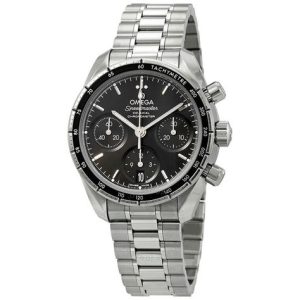Uncategorized
The Role of Swiss Watches in the World of Horology
When it comes to watchmaking, one name reigns supreme: Switzerland. Swiss watches have long been synonymous with precision, craftsmanship, and luxury, setting the gold standard in the world of horology. For centuries, Swiss watchmakers have been at the forefront of innovation, creating timepieces that blend artistic design with cutting-edge technology. Whether you’re a seasoned collector or a casual watch enthusiast, understanding the role of Swiss watches in horology is essential to appreciating the true essence of fine watchmaking.
At 360bestelitend.com, we delve into the fascinating legacy of Swiss watches and why they continue to dominate the world of horology.
1. The History of Swiss Watchmaking
Swiss watchmaking dates back to the 16th century, when Protestant refugees from France brought their watchmaking skills to Switzerland, particularly to the canton of Geneva. The region’s natural isolation and dedication to craftsmanship fostered the growth of a vibrant watchmaking industry. By the 19th century, Swiss watchmakers had mastered the art of mechanical movements, and Switzerland quickly became the epicenter of high-quality timepieces.
- The Birth of Precision: In 1844, the Swiss watch industry saw a breakthrough with the creation of the first chronometer by Abraham-Louis Breguet, setting the stage for a legacy of precision and reliability.
- The Rise of Iconic Brands: Legendary names like Rolex, Patek Philippe, Audemars Piguet, and Omega emerged over the following decades, further cementing Switzerland’s reputation for exceptional watchmaking.
Today, Swiss watches are a symbol of luxury, innovation, and timeless style, with the industry continuing to evolve while honoring centuries of tradition.
2. Swiss Watchmaking Standards and the “Swiss Made” Label

One of the key factors that sets Swiss watches apart from their competitors is the stringent standards they must meet to be labeled as “Swiss Made.” This label is a mark of excellence and signifies that the watch has been crafted in Switzerland under strict regulations.
- Swiss Watchmaking Criteria:
- The movement must be Swiss-made, with at least 50% of its production taking place in Switzerland.
- The movement must be tested and assembled in Switzerland.
- The final assembly and inspection of the watch must also occur in Switzerland.
This high standard ensures that Swiss watches are crafted with precision, quality materials, and exceptional craftsmanship, making them some of the most reliable and sought-after timepieces in the world.
3. Innovation and Precision: The Swiss Contribution to Horology
Swiss watchmakers have continually pushed the boundaries of watchmaking technology, developing some of the most groundbreaking innovations in the industry.
Mechanical Movements
- Swiss watchmakers are renowned for their mechanical movements, which are meticulously crafted and assembled by hand. The intricate components of mechanical watches, such as gears, springs, and escapements, require expert craftsmanship and are a testament to the skill and tradition of Swiss horologists.
The Introduction of the Quartz Movement
- In the 1970s, Swiss watchmakers revolutionized the industry with the introduction of the quartz movement. This innovation, led by the Swiss brand Omega and others, allowed for unparalleled accuracy and reliability, making Swiss watches more accessible and popular than ever before.
Chronograph Functions
- Swiss watches have been pioneers in developing advanced chronograph complications, such as the ability to measure elapsed time and track multiple events simultaneously. Brands like Tag Heuer and Longines have created iconic chronograph models that remain popular today.
Tourbillons
- One of the most prestigious complications in mechanical watches, the tourbillon was invented by Abraham-Louis Breguet in the 18th century to counteract the effects of gravity on timekeeping accuracy. Swiss manufacturers like Patek Philippe and Vacheron Constantin have continued to perfect this highly complex feature, adding it to their most prestigious models.
4. Iconic Swiss Watch Brands and Their Legacy
Swiss watches are home to some of the most iconic and respected brands in the world, each known for its unique blend of tradition, craftsmanship, and innovation. Here are just a few of the top names in Swiss watchmaking:
Rolex
- Perhaps the most recognizable Swiss watch brand, Rolex has set the standard for luxury and precision. Known for its robust designs and groundbreaking innovations like the Oyster case and Perpetual movement, Rolex watches have become a symbol of success and accomplishment.
Patek Philippe
- Renowned for its intricate complications and high-quality craftsmanship, Patek Philippe is one of the oldest and most respected names in Swiss watchmaking. The brand is especially known for its perpetual calendars, minute repeaters, and Grand Complication watches, which are considered some of the finest timepieces ever made.
Audemars Piguet
- Famous for creating the Royal Oak, the first luxury sports watch made of stainless steel, Audemars Piguet is known for combining sophisticated designs with technical prowess. The brand continues to innovate with new materials and complex movements.
Omega
- Known for its connection to space exploration (the Omega Speedmaster was worn during the Apollo missions), Omega is a leader in precision and design. The brand also pioneered the use of the coaxial escapement, a groundbreaking advancement in mechanical movement technology.
Jaeger-LeCoultre
- Known as the “watchmaker’s watchmaker,” Jaeger-LeCoultre is revered for its mastery in producing ultra-thin movements and complicated watch designs. The brand has created some of the most iconic pieces in watchmaking history, including the Reverso and the Master Ultra Thin series.
5. Swiss Watches and Luxury Market Dominance
Swiss watches are not only known for their precision but also for their luxury appeal. Many of the world’s most prestigious and expensive watches are Swiss-made, with limited editions, high-quality materials, and intricate craftsmanship driving their exclusivity.
- Materials: Swiss watches often feature materials like 18k gold, platinum, and diamonds, as well as specialized alloys designed for strength, corrosion resistance, and weight balance.
- Craftsmanship: The artistry involved in Swiss watchmaking elevates it to the level of haute horology, with master watchmakers handcrafting movements and dials with painstaking attention to detail.
- Investment Potential: Many Swiss watches, particularly limited editions and rare models, appreciate in value over time. Collectors often view these timepieces as not only functional pieces of art but also valuable investments.
6. The Influence of Swiss Watches on Global Watchmaking
Swiss watches have played a pivotal role in shaping the global watch industry. The rigorous standards established by Swiss watchmakers have influenced watchmaking practices worldwide, and Swiss innovations continue to inspire brands across the globe.
- Setting the Bar for Quality: Other watchmaking countries, such as Germany and Japan, have adopted high standards of craftsmanship and precision in their own watchmaking industries, often looking to Swiss brands for inspiration.
- Watchmaking Education: Switzerland remains a hub for horological education, with renowned institutions like the Swiss Watchmaking School in Biel/Bienne and WOSTEP (Watchmakers of Switzerland Training and Educational Program) educating the next generation of master watchmakers.
7. The Future of Swiss Watchmaking

While the Swiss watch industry has a storied history, it continues to evolve in the face of new challenges and innovations. Today, Swiss watch brands are embracing modern technologies, including:
- Smartwatches: Swiss watchmakers like TAG Heuer and Swatch are venturing into the smartwatch market, blending traditional craftsmanship with modern digital technology.
- Sustainability: Many Swiss watch brands are embracing sustainability, using eco-friendly materials and manufacturing practices to reduce their environmental impact.
- Customization and Innovation: Swiss brands continue to push the boundaries of design and craftsmanship, offering more options for customization and unique features in their timepieces.
Conclusion
Swiss watches have played an integral role in the history and evolution of horology, from their groundbreaking innovations in mechanical movements to their dominance in the luxury watch market. Whether you’re a casual admirer or a dedicated collector, understanding the legacy of Swiss watchmaking enriches your appreciation of these finely crafted timepieces.
At 360bestelitend.com, we offer a curated selection of Swiss-made watches, each representing the pinnacle of precision and luxury. Explore our collection and discover the timeless appeal of Swiss horology.

